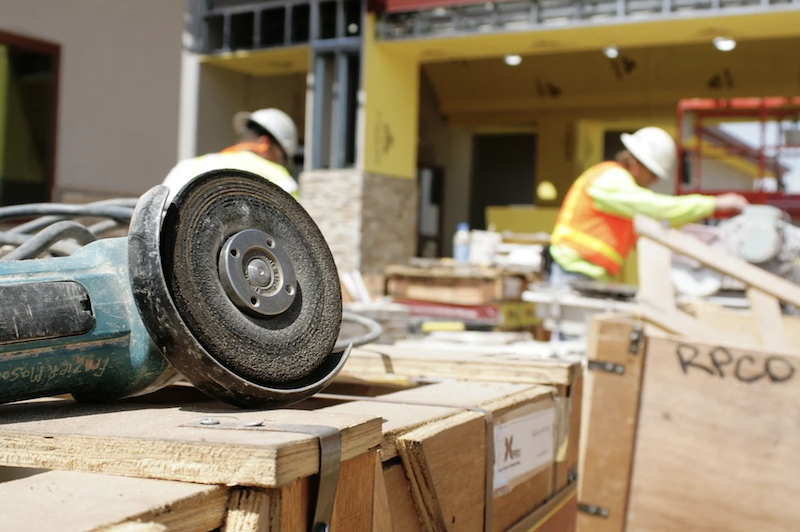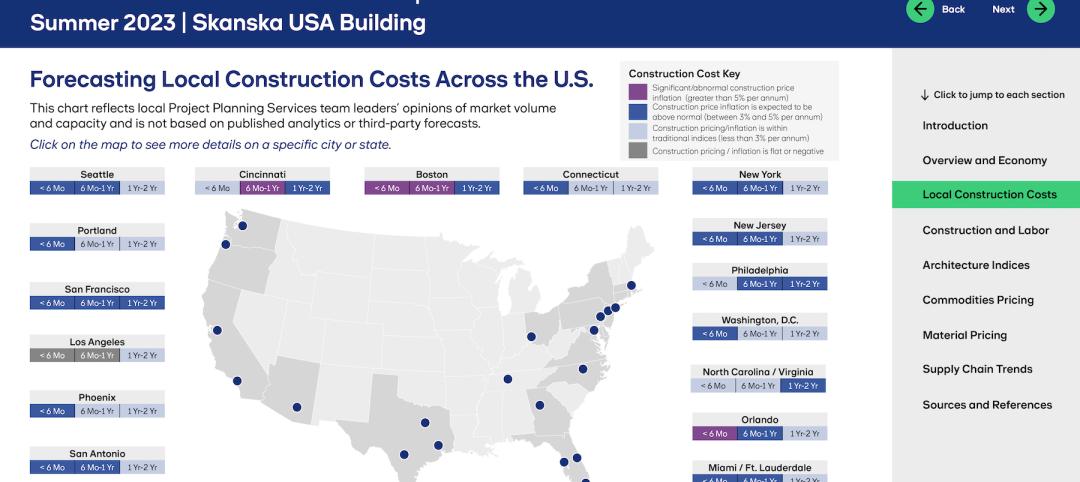Extreme price increases continued in July for a wide range of goods and services used in construction, according to an analysis by the Associated General Contractors of America of government data released today. Association officials urged President Biden to immediately end tariffs and quotas on steel, aluminum, lumber and other essential construction items to help stave off inflationary pressure in the construction industry.
“July was the sixth-straight month of double-digit price increases for construction inputs,” said Ken Simonson, the association’s chief economist. “In addition, lead times to produce or deliver many items keep lengthening. Many reports since the government collected this price data in mid-July show the trend will continue, at a minimum into the autumn and likely beyond, unless tariffs and quotas are removed.”
The producer price index for new nonresidential construction—a measure of what contractors say they would charge to erect five types of nonresidential buildings—rose 4.4% over the past 12 months. That was a small fraction of the 25.6% increase in the prices that producers and service providers such as distributors and transportation firms charged for construction inputs, Simonson noted.
There were double-digit percentage increases in the selling prices of materials used in every type of construction. The producer price index for steel mill products more than doubled from July 2020 to last month, leaping 108.6%. The index for lumber and plywood jumped 56.8% despite a large drop in mill prices from May to July. The index for copper and brass mill shapes rose 49.0% and the index for aluminum mill shapes increased 33.2%. The index for plastic construction products rose 26.7%. The index for gypsum products such as wallboard climbed 21.6%. The index for insulation materials rose 11.8%, while the index for prepared asphalt and tar roofing and siding products rose 10.9%.
In addition to increases in materials costs, transportation and fuel costs also spiked. The index for truck transportation of freight jumped 13.8%. Fuel costs, which contractors pay directly to operate their own trucks and off-road equipment, as well as through surcharges on freight deliveries, have also jumped.
Association officials urged the president to remove tariffs on key construction materials, including steel and aluminum. They noted that some countries have opted for quotas on steel and aluminum in place of tariffs, making supplies even tighter. They said these government limitations on key materials, if left in place, would undermine some of the benefits of the new infrastructure measure that passed in the Senate
“These tariffs and quotas are artificially inflating the cost of many key materials and doing more damage to the economy than help,” said Stephen E. Sandherr, the association’s chief executive officer. “Leaving these measures in place will undermine the broader benefits of the bipartisan new infrastructure measure the House should be passing.”
View producer price index data. View chart of gap between input costs and bid prices. View the association’s Construction Inflation Alert.
Related Stories
Apartments | Aug 22, 2023
Key takeaways from RCLCO's 2023 apartment renter preferences study
Gregg Logan, Managing Director of real estate consulting firm RCLCO, reveals the highlights of RCLCO's new research study, “2023 Rental Consumer Preferences Report.” Logan speaks with BD+C's Robert Cassidy.
Market Data | Aug 18, 2023
Construction soldiers on, despite rising materials and labor costs
Quarterly analyses from Skanska, Mortenson, and Gordian show nonresidential building still subject to materials and labor volatility, and regional disparities.
Apartments | Aug 14, 2023
Yardi Matrix updates near-term multifamily supply forecast
The multifamily housing supply could increase by up to nearly 7% by the end of 2023, states the latest Multifamily Supply Forecast from Yardi Matrix.
Hotel Facilities | Aug 2, 2023
Top 5 markets for hotel construction
According to the United States Construction Pipeline Trend Report by Lodging Econometrics (LE) for Q2 2023, the five markets with the largest hotel construction pipelines are Dallas with a record-high 184 projects/21,501 rooms, Atlanta with 141 projects/17,993 rooms, Phoenix with 119 projects/16,107 rooms, Nashville with 116 projects/15,346 rooms, and Los Angeles with 112 projects/17,797 rooms.
Market Data | Aug 1, 2023
Nonresidential construction spending increases slightly in June
National nonresidential construction spending increased 0.1% in June, according to an Associated Builders and Contractors analysis of data published today by the U.S. Census Bureau. Spending is up 18% over the past 12 months. On a seasonally adjusted annualized basis, nonresidential spending totaled $1.07 trillion in June.
Hotel Facilities | Jul 27, 2023
U.S. hotel construction pipeline remains steady with 5,572 projects in the works
The hotel construction pipeline grew incrementally in Q2 2023 as developers and franchise companies push through short-term challenges while envisioning long-term prospects, according to Lodging Econometrics.
Hotel Facilities | Jul 26, 2023
Hospitality building construction costs for 2023
Data from Gordian breaks down the average cost per square foot for 15-story hotels, restaurants, fast food restaurants, and movie theaters across 10 U.S. cities: Boston, Chicago, Las Vegas, Los Angeles, Miami, New Orleans, New York, Phoenix, Seattle, and Washington, D.C.
Market Data | Jul 24, 2023
Leading economists call for 2% increase in building construction spending in 2024
Following a 19.7% surge in spending for commercial, institutional, and industrial buildings in 2023, leading construction industry economists expect spending growth to come back to earth in 2024, according to the July 2023 AIA Consensus Construction Forecast Panel.
Contractors | Jul 13, 2023
Construction input prices remain unchanged in June, inflation slowing
Construction input prices remained unchanged in June compared to the previous month, according to an Associated Builders and Contractors analysis of U.S. Bureau of Labor Statistics Producer Price Index data released today. Nonresidential construction input prices were also unchanged for the month.
Contractors | Jul 11, 2023
The average U.S. contractor has 8.9 months worth of construction work in the pipeline, as of June 2023
Associated Builders and Contractors reported that its Construction Backlog Indicator remained unchanged at 8.9 months in June 2023, according to an ABC member survey conducted June 20 to July 5. The reading is unchanged from June 2022.

















